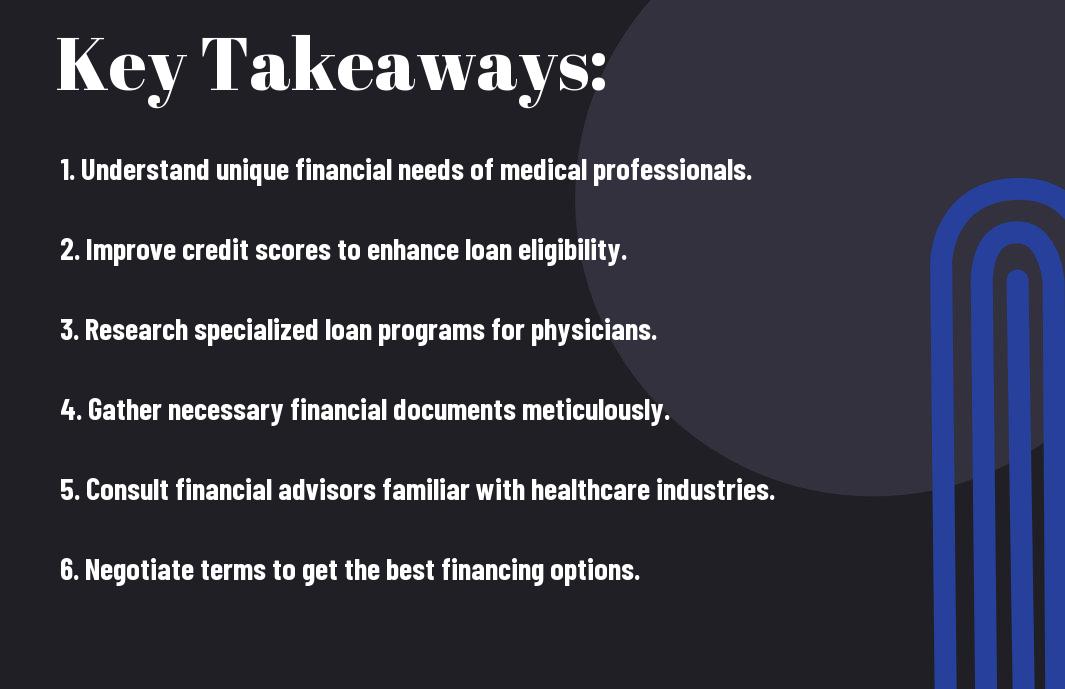Just like any other professional, securing financing as a physician can be complex. However, understanding the unique benefits of doctor loans can significantly ease your path to financial success. This guide will provide you with seven strategic steps tailored specifically for you, empowering you to take control of your financial future. Whether you’re looking to purchase a home or manage student debt, these steps will help you navigate the loan process effectively, ensuring you make the most of available resources.
Understanding Doctor Loans
The landscape of financing for physicians is unique, particularly with the availability of doctor loans. These specialized loans cater specifically to the financial needs of medical professionals, acknowledging their high earning potential and unique circumstances. Understanding the ins and outs of these loans can empower you to make informed financial decisions and leverage your expertise to your advantage when seeking out financing options.
Definition and Benefits
Loans designed specifically for doctors, or doctor loans, are financing options that consider your training, profession, and future earning potential. The benefits include lower down payments, no private mortgage insurance (PMI), and more flexible credit requirements, making it easier for you to secure financing while navigating the challenges of your medical career.
Eligibility Criteria
The eligibility criteria for doctor loans vary by lender but typically require you to be a licensed physician, dentist, or other qualified medical professional. Most lenders also look at the completion of your residency or fellowship, along with your projected income based on job offers or contract agreements.
In addition to your professional status, lenders may consider your credit score and overall financial health. Some lenders might offer flexibility for recent graduates or those in a residency program, understanding your current financial state and future earnings. It’s vital to check with individual lenders for specific requirements, as they can vary significantly based on the loan program and lender policies.

Preparing Financial Documents
Any successful loan application starts with well-prepared financial documents. Lenders require detailed information to assess your financial health, ensuring you are a viable candidate for doctor loans. Having your paperwork organized and readily available can expedite the approval process, allowing you to focus on your medical career while securing the financing you need.
Essential Documentation
Preparing your financial documentation involves gathering vital paperwork that lenders typically require. This includes your tax returns, W-2 forms, pay stubs, and bank statements. It’s advisable to also include any investment accounts or relevant loan documents to present a comprehensive picture of your finances.
Organizing Your Financial History
Around the time you start gathering documents, it’s beneficial to arrange your financial history in a clear and logical format. This not only aids in fulfilling lender requirements but also provides a snapshot of your financial situation.
Your financial history serves as an important narrative of your earnings, expenses, and overall fiscal responsibility. Collect all pertinent information, such as monthly budget summaries, proof of significant assets, and records of any outstanding debts. Presenting a concise and organized summary of your financial status will foster trust with your lender and enhance your chances of securing better loan terms.
Building Your Credit Profile
Not all credit profiles are created equal, especially for physicians looking to secure tailored financing options like doctor loans. To enhance your chances of obtaining favorable terms, it is crucial to actively manage and build your credit profile. Your credit score influences not only your interest rates but also the types of loans available to you as a physician.
Importance of Credit Score
To secure competitive financing, understanding the significance of your credit score is crucial. Lenders view your credit score as an indicator of your financial responsibility, impacting their willingness to extend credit and the terms associated with it. A higher score may grant you better rates and greater options, making it worthwhile to prioritize this aspect of your financial health.
Strategies for Improvement
Before you can unlock the best doctor loan options, it’s important to work on improving your credit score. Start by regularly checking your credit report for any inaccuracies that may be dragging down your score. Pay your bills on time and minimize outstanding debts, focusing on credit utilization. Additionally, consider diversifying your credit mix to show lenders you can handle different types of credit responsibly.
It is also beneficial to establish a budget that prioritizes saving and timely payments. Set up reminders for bill due dates and consider automatic payments for recurring expenses. If you have outstanding debts, create a repayment plan to tackle them systematically, and resist opening new credit lines unless necessary. By maintaining vigilance over your credit habits and implementing these strategies, you’ll be well on your way to enhancing your credit profile, ultimately making you a more attractive candidate for doctor loans.

Exploring Loan Options
Keep in mind that choosing the right loan is vital for financing your future. As a physician, you have access to various loan options specifically designed to suit your unique financial needs. Understanding these options will give you confidence when navigating the loan application process and ensure that you secure favorable terms for your investment.
Types of Doctor Loans
- Fixed Rate Mortgages
- Adjustable Rate Mortgages (ARMs)
- Specialty Medical Loans
- Conventional Loans
- Government-Sponsored Loans
Assume that you consider each loan type carefully based on your future plans and financial situation. Below is a comparison of doctor loan types:
| Fixed Rate Mortgages | Stability with consistent payments |
| Adjustable Rate Mortgages | Lower initial rates but variability in payments |
| Specialty Medical Loans | Designed specifically for medical professionals |
| Conventional Loans | Standardized loan terms with broader eligibility |
| Government-Sponsored Loans | Potentially lower rates and flexible terms |
Comparison of Lenders
Around the market, various lenders offer tailored loan products for physicians, and comparing them can help you make an informed decision. Assess each lender based on interest rates, repayment terms, and borrower requirements to determine the best fit for your situation. Here’s an overview of what to consider:
| Interest Rates | Determine affordability over time |
| Fees and Closing Costs | Estimate the overall expenses |
| Loan Amounts | Assess limits and borrowing flexibility |
| Repayment Terms | Match with your cash flow preferences |
| Customer Service | Evaluate responsiveness and support |
To effectively choose your lender, focus on their responsiveness and willingness to address your needs. Reviews and referrals from fellow physicians can provide insights into customer experiences, helping you feel confident in your choice. Utilize the following criteria to simplify your decision-making process:
| Reputation | Consider online reviews and testimonials |
| Flexibility | Explore loan customization options |
| Turnaround Time | Assess the speed of processing your application |
| Support Availability | Check for assistance during off-hours |
| Overall Experience | Gauge how comprehensive their services are |
Working with Mortgage Brokers
Unlike navigating the mortgage landscape alone, collaborating with a mortgage broker can streamline your financing process. These professionals possess extensive market knowledge and connections to lenders, making it easier for you to find options tailored to your needs. Additionally, they can simplify complex paperwork and negotiations, ultimately saving you time and stress throughout the mortgage journey.
Benefits of Professional Guidance
Among the many advantages of working with a mortgage broker, personalized advice stands out. They can help you assess your financial situation and determine the best loan products available to you. Moreover, they often have access to exclusive deals and terms, ensuring you secure favorable rates while also guiding you through the application process for a seamless experience.
Questions to Ask Your Broker
Above all, it is vital to ask the right questions to gauge your broker’s expertise. Inquire about their experience with doctor loans, their fee structures, and the various lenders they partner with. Additionally, understanding how they evaluate your financial profile will empower you to know what to expect during the mortgage process.
Plus, don’t hesitate to ask for references from previous clients. This feedback can provide insights into the broker’s reliability and effectiveness. Clarifying their communication style is important too; you’ll want a broker who keeps you informed and is accessible for your questions. By fully engaging with your mortgage broker and addressing these questions, you can foster a productive partnership that significantly eases your loan acquisition journey.
Navigating the Application Process
Many physicians find the application process for doctor loans daunting due to its complexity. However, understanding the key steps and potential challenges can help streamline your journey. Being well-prepared not only boosts your confidence but also enhances your chances of securing favorable financing options tailored to your unique situation. Knowing what to expect is important as you commence on this critical step in your financial future.
Steps in the Application
Behind every successful doctor loan approval lies a systematic approach. Start by gathering necessary documents such as your income statement, tax returns, and proof of residency. Next, research lenders who specialize in doctor loans to find the best fit for your needs. Complete the application thoroughly, ensuring all information is accurate, then submit it along with necessary documents. Finally, be prepared for follow-up questions or additional documentation requests from the lender.
Common Pitfalls to Avoid
The journey to securing a doctor loan can be hindered by several common pitfalls. Lack of preparation, submitting inaccurate information, or failing to understand your credit profile can dramatically impact your chances of approval. Additionally, overlooking lender fees or terms can lead to unexpected financial burdens, potentially stalling your loan process.
Further, one of the most significant pitfalls you might encounter is the misconception that your income alone guarantees approval. Many lenders also evaluate your credit history, debt-to-income ratio, and overall financial stability. Failing to address weaknesses in these areas may affect your eligibility. Take the time to review your credit report, pay down any existing debts, and hold off on large purchases before applying. Avoiding these pitfalls will put you in a stronger position to navigate the application process successfully.
Final Words
Conclusively, by following the seven strategic steps outlined in this guide, you can effectively navigate the complexities of securing doctor loans. These steps not only enhance your chances of obtaining favorable financing but also empower you to make informed decisions that align with your unique financial goals. As a physician, leveraging your knowledge and resources will pave the way for unlocking the financing you need to advance your career and fulfill your aspirations.
FAQ
Q: What are the key steps for physicians to take when applying for a doctor loan?
A: Physicians should start by assessing their financial situation and understanding the unique aspects of doctor loans, which often cater to medical professionals. The key steps include:
- 1. Researching different lenders that offer doctor loans and their specific terms.
- 2. Gathering necessary documentation, such as proof of income, residency status, and credit history.
- 3. Pre-qualifying for loans to understand how much financing you can access.
- 4. Considering the loan type that best suits your needs, whether it’s a fixed-rate or adjustable-rate mortgage.
- 5. Comparing interest rates and closing costs from multiple lenders.
- 6. Consulting with financial advisors familiar with physician financial needs for tailored advice.
- 7. Submitting a complete application to the selected lender and being prepared to address any follow-up requests.
Q: How important is credit score when applying for a doctor loan?
A: While credit score is an important factor in securing financing, doctor loans are often more flexible compared to conventional loans. Lenders may place more emphasis on future earning potential and debt-to-income ratios for medical professionals. That said, a higher credit score can help you secure better interest rates and terms. Physicians should aim to review their credit report before applying, addressing any discrepancies or outstanding debts that could affect their score, ultimately enhancing their loan application.
Q: Are there specific benefits to physician loans that differ from traditional mortgage options?
A: Yes, physician loans offer several advantages tailored to the financial profiles of medical professionals. Some of these benefits include:
- 1. Low or no down payment options, making home ownership more feasible right after residency.
- 2. No private mortgage insurance (PMI) requirement, which can lead to significant savings over time.
- 3. More lenient eligibility criteria regarding credit scores and income verification.
- 4. Consideration of future income potential when evaluating debt-to-income ratios.
- 5. Flexibility in loan amounts to accommodate high-value properties that align with a physician’s lifestyle.
These features make physician loans a preferred choice for many in the medical field looking to secure homes efficiently.




